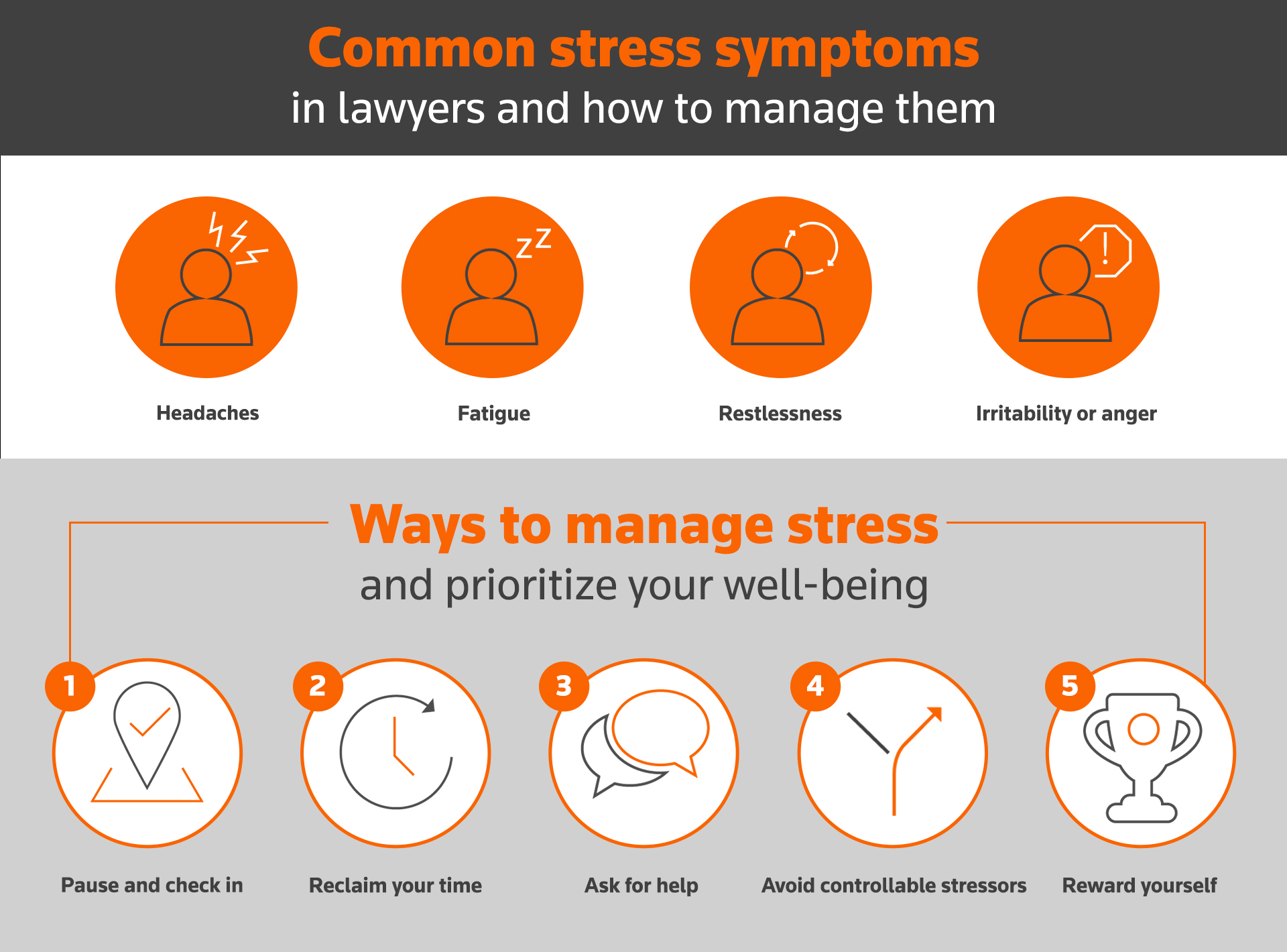To say that being a lawyer is a high-stress occupation is a gross understatement. From ensuring you’re up to date on the latest legal and procedural changes to responding quickly to clients’ requests and demands, you face constant pressure to do and achieve at the highest level. What’s more, in today’s “always on” culture, there’s never an excuse to not meet a deadline or respond to a client’s inquiry.
Compounding the stressors attorneys face is the fact that many of the duties and responsibilities associated with practicing law are completely outside of your control. And, professionally, your value is inherently tied to how many hours you bill.
Given the demands associated with practicing law, it’s easy to get caught up in the hectic pace and endless lists of to-dos. However, it’s important to consider the toll chronic stress takes on your wellness both physically and mentally as a lawyer. In a recent Reuters study, 66% of respondents said that their time in the legal profession had been detrimental to their mental health.
If you’re an attorney who is feeling the ill-effects of too much work-related stress, it’s time to pause and reflect on ways you can make your well-being a priority.

Changing your personal paradigm
Pause and check in
The demands of work can create tunnel vision and, before you know it, you’re floundering and feeling overwhelmed. On a daily basis, take time to be still and evaluate how you feel, both physically and mentally. Do you feel calm and connected to the work you’re doing or is your heart racing and thoughts scattered? One of the easiest, and more effective, ways to quiet the mind and physical sensations associated with stress is to focus on your breath. According to Harvard Medical School, shifting your focus and paying attention to your breathing elicits a natural relaxation response in your body. Practicing deep breathing techniques even for a few minutes each day can reduce your heart rate, lower your blood pressure, and promote overall feelings of tranquility.
Reclaim your time
Attorneys are notorious for putting in long hours at the office. However, even if you don’t routinely work 80-hour weeks, when your thoughts are consumed by work-related matters and not focused on family, friends and enjoying life, something needs to shift. Setting boundaries and establishing clear lines between your professional and personal lives will not only provide time to focus on the people and things that matter outside of work, but also ensures you have the physical, emotional and mental capacity and stamina to step up when you’re handling a complex matter or preparing for trial.
Ask for help
Historically, the hallmarks of the legal profession require attorneys to be intelligent, confident, and highly competent. By nature, most attorneys are competitive, trend towards perfectionism, and struggle to admit when they don’t know something or need help. These personality traits can lead an attorney to push beyond their limits and eventually suffer burnout. Being brave enough to be vulnerable and admit when you don’t have all the answers can be extremely liberating. Doing so may also help you see the obstacles you face in a new light and allow you to come up with solutions that benefit both you and your firm.
Avoid controllable stressors
Controllable stressors are those that can be managed, such as scheduling time for yourself, overcommitting, and setting boundaries with others. When you are able to control the things you see as stressors, it can have a positive effect on your overall wellness. Additionally, it can help to increase productivity and the ability to handle challenging situations with ease.
Reward yourself
Taking time to recognize your accomplishments (as well as others!) and treat yourself to something special can help to boost your self-esteem and reduce feelings of anxiety. It’s important to remember that self-care is not a selfish act, it’s an important part of your mental health and can help to create a sense of balance in your life. Rewards can come in many forms, such as a special meal or treat, a night out with friends, a relaxing massage or even just a few moments to yourself. By finding meaningful ways to reward yourself, you can help to reduce stress and create a more positive outlook on life.
Today, many law firms realize they cannot afford to turn a blind eye to the human side of their attorneys. The stakes, from both a human and business perspective, are simply too high. To attract and retain top talent and compete for new business, firms must seek out new and innovative solutions to provide clients with the value and answers they need. Learn more about how you can start bringing a more balanced approach to your firm.








